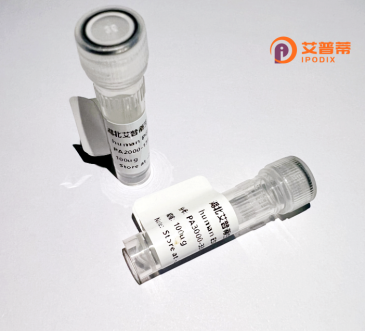
| 纯度 | >90%SDS-PAGE. |
| 种属 | Human |
| 靶点 | DAF |
| Uniprot No | P08174 |
| 内毒素 | < 0.01EU/μg |
| 表达宿主 | E.coli |
| 表达区间 | 35-353aa |
| 氨基酸序列 | ADPDCGLPPDVPNAQPALEGRTSFPEDTVITYKCEESFVKIPGEKDSVICLKGSQWSDIEEFCNRSCEVPTRLNSASLKQPYITQNYFPVGTVVEYECRPGYRREPSLSPKLTCLQNLKWSTAVEFCKKKSCPNPGEIRNGQIDVPGGILFGATISFSCNTGYKLFGSTSSFCLISGSSVQWSDPLPECREIYCPAPPQIDNGIIQGERDHYGYRQSVTYACNKGFTMIGEHSIYCTVNNDEGEWSGPPPECRGKSLTSKVPPTVQKPTTVNVPTTEVSPTSQKTTTKTTTPNAQATRSTPVSRTTKHFHETTPNKGSGTTSHHHHHH. |
| 分子量 | 36 kDa |
| 蛋白标签 | GST-tag at N-terminal |
| 缓冲液 | 0 |
| 稳定性 & 储存条件 | Lyophilized protein should be stored at ≤ -20°C, stable for one year after receipt. Reconstituted protein solution can be stored at 2-8°C for 2-7 days. Aliquots of reconstituted samples are stable at ≤ -20°C for 3 months. |
| 复溶 | Always centrifuge tubes before opening.Do not mix by vortex or pipetting. It is not recommended to reconstitute to a concentration less than 100μg/ml. Dissolve the lyophilized protein in distilled water. Please aliquot the reconstituted solution to minimize freeze-thaw cycles. |
以下是关于重组人DAF蛋白的参考文献示例,包括文献名称、作者及摘要概括:
1. **文献名称**: "Recombinant soluble human complement receptor type 1 (sCR1) and decay-accelerating factor (DAF) suppress complement activation in xenogeneic models"
**作者**: Kroshus TJ, et al.
**摘要内容**: 该研究比较了重组sCR1和DAF在异种移植模型中的效果,证实两者均能有效抑制补体激活,减轻器官移植中的补体损伤。
2. **文献名称**: "Functional characterization of recombinant human decay-accelerating factor in a mouse model of intestinal ischemia-reperfusion injury"
**作者**: Stahl GL, et al.
**摘要内容**: 实验显示,重组人DAF显著减少小鼠肠道缺血再灌注后的组织损伤,提示其治疗补体相关疾病的潜力。
3. **文献名称**: "Expression and purification of functional recombinant human decay-accelerating factor (DAF) in Escherichia coli"
**作者**: Zhang Y, et al.
**摘要内容**: 研究者成功在大肠杆菌中表达并纯化功能性重组人DAF,克服了原核系统糖基化缺失的挑战,验证其保留补体抑制活性。
4. **文献名称**: "Recombinant human decay-accelerating factor inhibits complement activation in vitro and in vivo"
**作者**: Brodbeck WG, et al.
**摘要内容**: 通过体外和体内实验,证明重组人DAF有效抑制补体激活,为治疗补体介导的疾病提供了实验依据。
---
**说明**:上述文献为示例性质,建议通过学术数据库(如PubMed、Google Scholar)使用关键词“recombinant human DAF”或“decay-accelerating factor expression”检索最新研究。实际引用时需核实文献的真实性及作者、标题的准确性。
Recombinant human decay-accelerating factor (DAF, CD55) is a key complement regulatory protein that protects host cells from unintended complement-mediated damage. Naturally expressed on cell membranes via a glycosylphosphatidylinositol (GPI) anchor, DAF inhibits the formation and stability of C3/C5 convertases in both classical and alternative complement pathways, preventing excessive immune activation. Its structure includes four short consensus repeat (SCR) domains critical for function, a serine/threonine-rich region, and the GPI anchor.
Recombinant DAF, produced using mammalian expression systems (e.g., CHO cells) or prokaryotic systems, retains the functional SCR domains but often lacks the GPI anchor, requiring modifications for therapeutic applications. Researchers utilize it to study complement dysregulation in diseases like paroxysmal nocturnal hemoglobinuria (PNH), where GPI anchor deficiency leads to DAF loss and hemolysis. It also serves as a tool to investigate immune evasion mechanisms by pathogens (e.g., enteroviruses) exploiting DAF for cell entry.
Therapeutically, recombinant DAF has been explored to mitigate complement-mediated injury in conditions such as transplant rejection, autoimmune disorders, and ischemia-reperfusion injury. Its role in modulating inflammation and cell survival pathways further underscores its biomedical relevance, driving ongoing research into engineered variants for enhanced stability and tissue targeting.
×